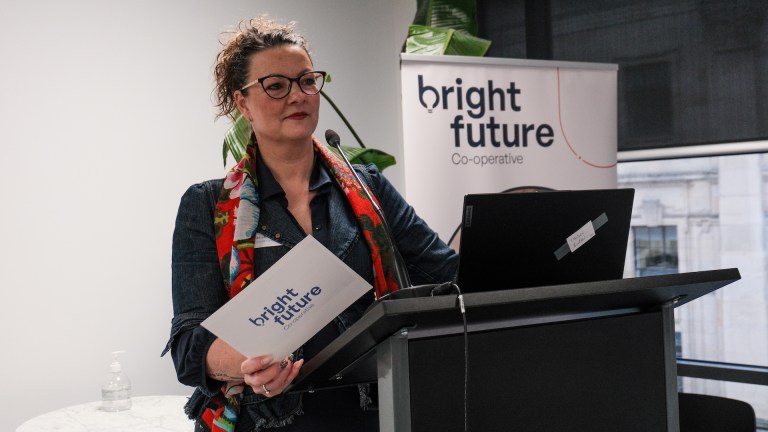Government guidance has said the use of personality tests makes finding jobs harder for neurodivergent people, while academics have found that autistic and neurodivergent people view the tests as a negative and inappropriate experience.
Autism charities told Big Issue the widespread use of tests was not only harming applicants but making companies miss out on talented workers.
“The use of personality tests in recruitment processes, particularly for entry-level roles, is something that can present significant barriers for autistic applicants and others who are neurodivergent,” Dr Chris Papadopoulos, lead of the London Autism Group Charity, told Big Issue.
“We’ve encountered this a lot, and the anxiety of facing non-neurodivergent-friendly tests can be so overwhelming that it might even prevent someone from applying for a job in the first place.”
Jolanta Lasota, chief executive of Ambitious about Autism, told Big Issue: “Psychometric tests can be an enormous barrier to an autistic person securing employment. Sadly, we work with many highly qualified autistic people who have been unable to find work due to the prevalence of these types of tests. This has to change.”
Hilary Fertig, executive manager of Employment Autism, said: “Online tests may be discriminatory if, for example, they preclude the use of assistive technology, or if the question is nuanced – especially with reference to social dynamics, or abstract and requiring ‘second guessing’ of the purpose of the question.”
Advertising helps fund Big Issue’s mission to end poverty
“While employers may have many applications to process, especially for an entry level role, using a standard ‘checklist’ to screen candidates likely means that they could be eliminating potentially great employees simply because their application process is inaccessible.”
While John Lewis said it used personality tests, it also said it made interview questions publicly available online to help applicants prepare. Metro Bank also confirmed it used psychometric testing for retail roles. Pandora said that while it uses a “retail assessment”, it is not mandatory, and that “no candidates are automatically rejected based solely on the outcome of this assessment”.
Meanwhile, Morrisons said it uses the tests but is introducing a new online assessment in the spring which “will have far greater functionality to support all applicants, including those that are neurodivergent”.
Zara, Tesco, Lush, KFC and Lidl all confirmed they do not use psychometric tests. A spokesperson for Lush said: “Lush doesn’t include use personality (psychometric) tests as part of the recruitment process as we recognise the risks that it can exclude candidates who are neurodiverse and may think outside of the options provided. Although there are instances where tests can eliminate bias, we choose to do that by anonymised screening instead.”
H&M, LEGO, Boss and Boux Avenue were among the companies who refused to say if they used the tests.
“The government is saying they’re trying to get young people back into work, but that is a big hurdle,” said Alex Hawkins, chief executive of the Canvey Island Youth Project, which runs services to help young people into work.
Advertising helps fund Big Issue’s mission to end poverty
“It’s devastating. Not only do you not get the job when you could do the job, but they’re not getting into employment. These tests are ever so negative when they come back and tell you what you’re personality’s about. When you’re neurodiverse and feeling like you’re not quite right, that’s a massive blow. Employers are missing out on people who could do a good job,” said Hawkins. “They showed me the McDonald’s one and I just went ‘huh’. I wouldn’t have passed it, and I’m the CEO.”
While accommodations may be available, said Hawkins, many young people did not realise they needed them. “You might not see it as a need until you finish. They might just think it’s for people with physical disabilities, or dyslexia, they might not think it’s for them,” Hawkins said.
Anna*, who is also autistic, is trying to find graduate jobs in her final year of university. “I haven’t encountered a single application that hasn’t requested psychometric testing,” she said. “No matter how hard I try – they tell you to answer as honestly as possible ºI feel like I just don’t stand a chance.
“They just offer extra time, that’s it. It’s not much use to you,” she said. “You start to think, ‘Is it even worth asking?’”
A spokesperson for Co-op said: “At Co-op, we are committed to making our recruitment processes inclusive and accessible to all, including neurodivergent candidates.
“We recognise that the impact of neurodivergence is unique to each individual, and there is no universal solution to meet everyone’s needs. That’s why we offer reasonable adjustments throughout the recruitment process to support candidates, such as alternative assessments or exemptions, depending on their specific circumstances.
Advertising helps fund Big Issue’s mission to end poverty
“Our assessments are carefully designed and validated to ensure fairness and effectiveness while helping us match candidates’ strengths to the right roles. We take feedback seriously and continue to review and evolve our practices to remove barriers and provide an equal opportunity for all.”
A spokesperson for Pandora said: “We are committed to fostering inclusivity and equity in our hiring practices. Towards the end of 2024, we conducted a third-party inclusivity review, which reassured us that our workforce reflects neurodiversity across the wider population.
“We acknowledge there is always room for improvement and welcome feedback to help us refine our processes. We are sorry to hear that the individual interviewed did not have a positive experience applying at Pandora.”
A spokesperson for McDonald’s said: “We are passionate about the importance of a diverse workforce and the benefits this brings throughout the business including within our restaurants. With this in mind, all candidates are given the opportunity before they complete the assessment to request any reasonable adjustments, such as support completing an interview or assessment to complete the recruitment process, ensuring a fair and accessible process for everyone.
“As is common practice throughout the hospitality industry, at McDonald’s we do use online personality assessments as part of our recruitment process. We receive over 1.7 million applications a year and in order to effectively select the best candidates for the role we use a personality assessment, designed by an industry-leading organisation, to ensure that applicants are suited to working as part of a team in the high-pressure environment of a busy restaurant.”
Do you have a story to tell or opinions to share about this? Get in touch and tell us more. Big Issue exists to give homeless and marginalised people the opportunity to earn an income. To support our work buy a copy of the magazine or get the app from the App Store or Google Play.
Advertising helps fund Big Issue’s mission to end poverty










